Our textile thread products
Ubon Trading (Nantong) Co., Ltd. is one of the large-scale textile thread suppliers in the textile industry of the Yangtze River Delta region. We have joined hands with 30 well-known textile thread manufacturers to establish one of the large-scale textile thread factory alliances in China. At present, the types of yarns produced and supplied by the company include double-twisted yarn, feather yarn (mink-like yarn), sewing thread, core-spun yarn and stretch yarn.
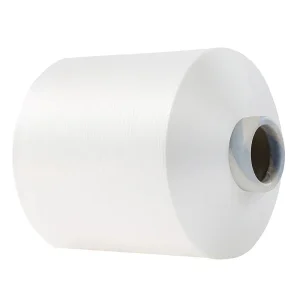
TTY Twisted Yarn
TTY Twisted Yarn
Features
- 20D-1000D/7-480F
- 60TPM-1800TPM
- Monofilament twisting
- Fixed length and fixed weight, uniform twist tension
- No oil stains, no broken filaments
- Self-developed setting equipment for uniform setting
- Product development available based on customer samples
Uses
- Warp and weft yarns for garment fabrics
- Curtain fabrics
- Warp and weft yarns for automotive fabrics
- Industrial fabrics, etc.
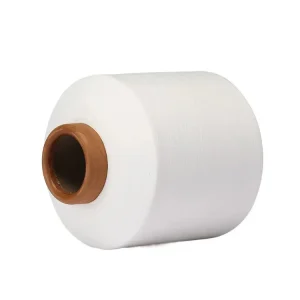
TDY Twisted Yarn
TDY Twisted Yarn
Features
- 20D-1000D/7-480F
- 60TPM-1800TPM
- Monofilament twisting
- Fixed length and fixed weight, uniform twist tension
- No oil stains, no broken filaments
- Self-developed setting equipment for uniform setting
- Product development available based on customer samples
Uses
- Warp and weft yarns for garment fabrics
- Curtain fabrics
- Warp and weft yarns for automotive fabrics
- Industrial fabrics, etc.
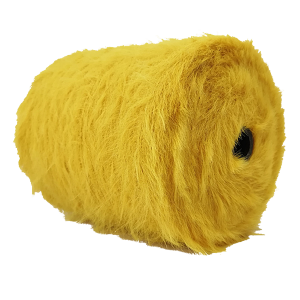
Nylon 5.0cm Feather Yarn
Nylon 5.0cm Feather Yarn
Features
- Soft and lightweight texture
- Feather-like appearance
- High durability and long service life
- Excellent wrinkle resistance, not easy to crease
- Easy to care for and store
- Offering a wide range of color and style options
Uses
- Knitted and crocheted products: such as scarves, hats, shawls, etc.
- Garment and accessory decoration
- Home accessories: such as throw pillows, sofa blankets, etc.
- Costume design and stage prop production
- Handicrafts: such as yarn jewelry, decorative ornaments, etc.
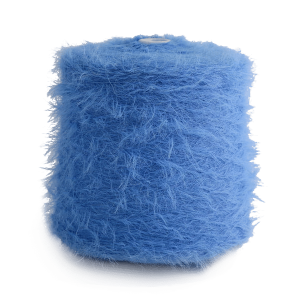
Nylon 4.0cm Feather Yarn
Nylon 4.0cm Feather Yarn
Features
- High strength
- Eco-friendly properties
- Good temperature resistance
- High elasticity
- Low elasticity
- Anti-pilling
- High toughness
- UV resistance
- Excellent breathability
- Good moisture absorption
- High wear resistance
- Anti-static
Uses
- Socks
- Webbing production
- Crochet knitting
- Handicrafts
- Woven baskets
- Sweaters
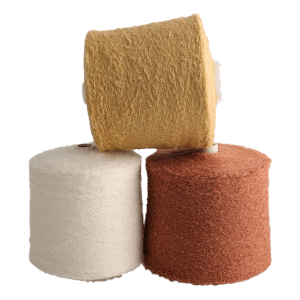
Nylon 2.0cm Feather Yarn
Nylon 2.0cm Feather Yarn
Features
- High strength
- Eco-friendly properties
- High wear resistance
- Low elasticity
- Good temperature resistance
- Anti-static
- Excellent breathability
- Recyclable
- UV resistance
- Antibacterial properties
- Good luster
- Flame-retardant properties
Uses
- Socks
- Webbing production
- Crochet knitting
- Handicrafts
- Woven baskets
- Sweaters
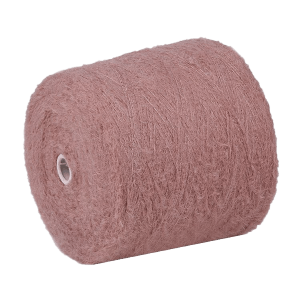
Nylon 1.3cm Feather Yarn
Nylon 1.3cm Feather Yarn
Features
- Smooth touch
- High strength
- High wear resistance
- Eco-friendly properties
- Excellent high-temperature resistance
- Low/medium elasticity
- High elasticity
- Anti-pilling
- Good moisture absorption
- Excellent breathability
- Antibacterial function
- Anti-static
- UV resistance
- Far-infrared function
- Flame-retardant properties
- Good luster
Uses
- Socks
- Gloves
- Knitted scarf
- Sweater
- Sports bra
- Athleisure wear / Sports apparel
- Leggings
- Seamless underwear
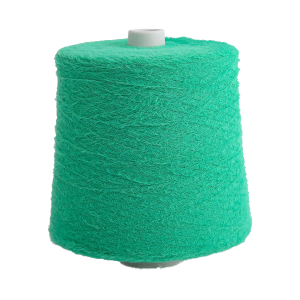
Nylon 0.9cm Feather Yarn
Nylon 0.9cm Feather Yarn
Features
- Smooth touch
- High strength
- High wear resistance
- Eco-friendly properties
- Low elasticity
- High elasticity
- Good breathability
- Good luster
- Excellent toughness
- Anti-pilling
Uses
- Socks
- Knitted products / Knitwear
- Knitted hat
- Sweater
- Knitted scarf
- Gloves, etc.
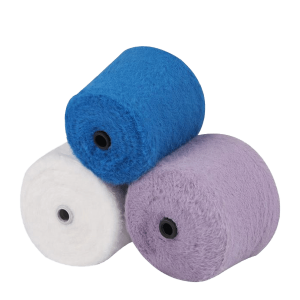
Nylon 0.5cm Feather Yarn
Nylon 0.5cm Feather Yarn
Features
- Plump and fluffy texture
- Soft and warm luster
- Smooth and delicate touch
- Soft yet with good strength
- With thermal insulation performance
Uses
- Toys
- Home goods / Household items
- Clothing / Apparel
- Footwear
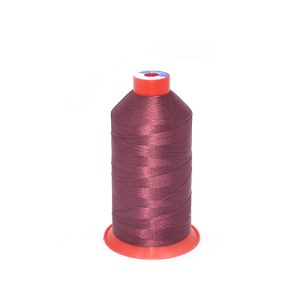
Polyester Sewing Thread
Polyester Sewing Thread
Features
- High strength: Its breaking strength is superior to that of sewing threads made from natural fibers such as cotton thread. It is not easy to break during the sewing process, can withstand large tensile forces, and is suitable for sewing thicker or stiffer fabrics, such as denim and canvas.
- Good wear resistance: The structure of polyester fiber makes it friction-resistant. During repeated sewing and use, the stitch is not easy to wear and break due to friction, which extends the service life of the sewn products.
- Strong chemical resistance: It has good resistance to chemicals such as acids, alkalis, and detergents. When washed or in contact with chemicals, the performance of the thread is not easily affected, and problems such as discoloration and deterioration are less likely to occur.
- Low shrinkage rate: Polyester has good stability, and the polyester sewing thread after treatment has a low shrinkage rate. The sewn clothes or products are not easy to deform due to the shrinkage of the thread after washing.
- Good light resistance: Compared with cotton thread, it is not easy to age and become brittle under sunlight, making it suitable for outdoor products or sewn products that are often exposed to light.
Uses
- Formal wear
- Quilting
- Shoes
- Leather products
- Bedding
- Invisible stitches / Blind stitches
- Interior soft furnishings
- Industrial applications, etc.
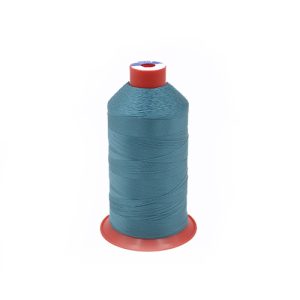
Bonded Polyester Thread
Bonded Polyester Thread
Features
- High strength: The high strength of polyester itself combined with surface treatment makes the breaking strength of bonded thread much higher than that of ordinary polyester sewing thread. It can withstand large tensile forces and is suitable for sewing heavy fabrics (such as canvas, denim, leather) or load-bearing parts (such as luggage seams, tent corners).
- Abrasion resistance: The smooth surface coating reduces friction between the thread, the fabric, and sewing machine parts, extending the service life of the thread. It is especially suitable for high-speed sewing or scenarios with repeated friction (such as industrial machinery sewing, outdoor products).
- Wrinkle resistance and stability: The wrinkle resistance and low shrinkage rate of polyester are retained in the bonded thread. After the sewn products are washed or used, the stitches are not easy to deform or wrinkle.
- Chemical resistance: It has good resistance to acids, alkalis, detergents, etc., and is suitable for products that require frequent cleaning or contact with chemicals (such as work clothes, protective equipment).
Uses
- Leather shoes
- Leather products
- Furniture accessories
- Outdoor products
- Sports goods
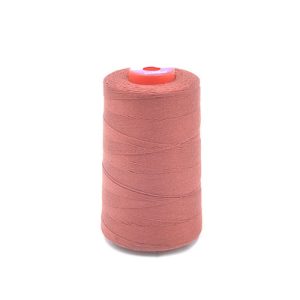
Core Spun Polyester Thread
Core Spun Polyester Thread
Features
- Combination of high strength and toughness: The core thread provides high breaking strength, ensuring the thread is not easy to break during sewing and making it suitable for sewing heavy fabrics (such as denim, canvas, and leather); the outer polyester layer enhances the thread’s wear resistance and friction resistance, extending the service life of the stitches.
- Smooth surface for smooth sewing: The coating of the outer polyester fiber makes the thread surface smoother, reducing the frictional resistance between the thread, the fabric, and sewing machine parts during sewing, and lowering the probability of thread breakage and fuzzing. It is especially suitable for high-speed industrial sewing.
- Good stability: The polyester outer layer has low shrinkage, chemical resistance (resistant to acids, alkalis, and detergents), and relatively good light resistance. The composite structure of the core thread and the outer layer reduces the deformation of the thread during washing or use, ensuring long-lasting and stable stitches.
- Wide adaptability: By adjusting the core thread material and the specifications of the outer polyester (such as thickness and twist), it can adapt to different fabrics and sewing needs, balancing strength and delicacy.
Uses
- Fashion clothing / Fashion apparel
- Shirts
- Undergarments / Intimate wear
- Swimwear
- Uniforms
- Work clothes / Workwear, etc.
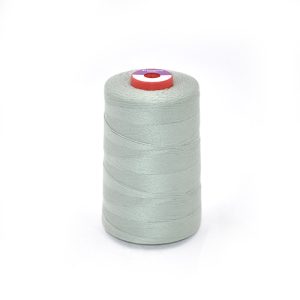
Spun Polyester Thread
Spun Polyester Thread
Features
- High cost-effectiveness: The production process is relatively simple, and the cost is lower than that of filament threads or composite threads (such as bonded threads and core-spun threads). It is suitable for ordinary sewing scenarios sensitive to cost.
- Soft hand feel: The twisted structure of short fibers endows the thread with a certain degree of fullness and softness. After sewing, the stitches have a mild hand feel, making it suitable for scenarios with high requirements for touch, such as intimate clothing and thin fabrics.
- Moderate strength: Polyester itself has high strength, and the breaking strength of short-fiber threads can meet most daily sewing needs. However, it is lower than that of filament polyester threads (such as bonded threads) and is not suitable for high-strength load-bearing scenarios.
- Prone to fuzzing: Since the bonding between short fibers relies on twist, slight fuzzing may occur on the thread surface during long-term friction or high-speed sewing, and its wear resistance is slightly inferior to that of filament threads with surface treatment.
- Good stability: It inherits the characteristics of polyester, such as wrinkle resistance, low shrinkage, and chemical resistance (resistant to detergents, acids, and alkalis). The stitches are not easy to deform after washing.
Uses
- Knitwear
- Shirts
- Women’s clothing / Ladies’ apparel
- Jackets
- Woven fabrics
- Underwear / Lingerie: “Underwear” , “Lingerie”
- Children’s clothing / Kids’ wear, etc.
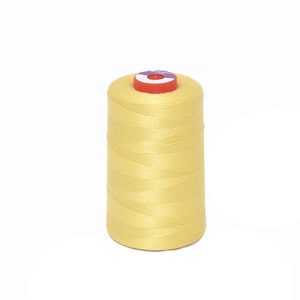
Textured Polyester Thread
Textured Polyester Thread
Features
- Smooth thread body with uniform diameter: The low-puff structure makes the thread surface flatter and ensures high consistency in thickness. During sewing, the stitches are clearer and neater, making it especially suitable for scenarios requiring high stitch precision.
- Enhanced wear resistance: The tight arrangement of fibers reduces the loosening of surface fibers. Compared with ordinary puffy short-fiber threads, it is less prone to fuzzing and pilling, extending the service life of the stitches.
- More stable strength: The tight structure reduces fiber slippage between fibers, and its breaking strength is slightly higher than that of ordinary polyester short-fiber threads of the same specification, resulting in a lower probability of thread breakage during sewing.
- Low shrinkage and stability: It inherits the low shrinkage characteristic of polyester, and the tight structure minimizes the deformation of the thread body after washing or stress, ensuring better stitch retention.
- Suitable for fine sewing: The thread body is firm and has moderate softness (but slightly stiffer than puffy threads), making it suitable for high-speed sewing or sewing of thin fabrics and fine fabrics. It is less likely to have problems such as bulky stitches or thread jamming.
Uses
- Underwear
- Intimate wear / Close-fitting undergarments
- Swimwear
- Sportswear
- Stretch clothing / Elastic clothing
- T-shirt, etc.
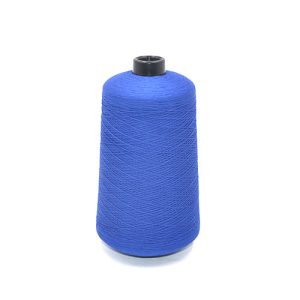
High Bulk Textured Polyester Thread
High Bulk Textured Polyester Thread
Features
Core Advantage (Most Prominent Feature): By adjusting fiber twist, using polyester fibers with hollow/irregular cross-sections, or applying air expansion treatment during spinning, more gaps are created inside the thread. This gives the thread a fluffy and plump appearance, along with a lighter and softer touch.
Inherits Basic Advantages of Polyester:
- High strength: Not easy to break, suitable for sewing scenarios requiring a certain degree of tensile force;
- Chemical resistance: Resistant to acids, alkalis, and detergents, with no easy deformation or fading after washing;
- Good stability: Low shrinkage, and better dimensional stability than natural fiber threads (e.g., cotton thread).
Unique Functions:
- Strong coverage: The fluffy thread can cover the fabric surface more evenly during sewing/weaving, reducing stitch marks and improving the appearance of finished products;
- Moderate elasticity: Some high-loft threads gain a certain elasticity through process adjustment, making them suitable for fabrics that require slight stretching (e.g., knitwear);
- Auxiliary warmth retention: The gaps in the thread can trap air when used in textiles, enhancing the fabric’s warmth retention (e.g., plush toys, linings of winter clothing).
Uses
- Underwear
- Sportswear
- Shirts
- Baby clothing / Infant clothing
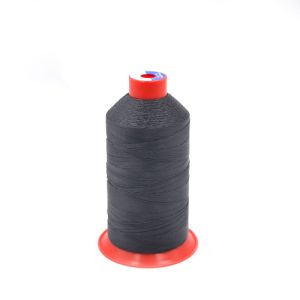
CF Nylon Thread
CF Nylon Thread
Features
Monofilament and Multifilament:
- Monofilament: A single continuous filament used directly. The thread body is relatively stiff and is often used in scenarios requiring shaping, such as fishing nets and sieves.
- Multifilament: Formed by combining and twisting multiple monofilaments. The thread body is soft and has higher strength, making it the main type for garment sewing and fabric weaving.
Basic Advantages of Filament Structure
The fibers are continuous filaments (with a length of up to several kilometers). After twisting, the formed thread body has a smooth surface and uniform evenness, without the fuzz and joints commonly seen in short-fiber threads. Therefore, it is not easy to pill or break during sewing or weaving, and the finished product has a neater and more delicate appearance.
Inherent Properties of Nylon Material
- High elasticity and resilience: Nylon’s elasticity is close to that of wool; it can fully recover when stretched to 3-6%. The thread made from it is not easy to deform after being stressed, making it suitable for scenarios requiring repeated stretching (such as stretch clothing and sports equipment).
- Excellent wear resistance: Its wear resistance ranks first among all textile fibers—10 times higher than cotton and 20 times higher than wool. Therefore, nylon filament thread is friction-resistant, anti-abrasion, and has a long service life.
- Relatively high strength: The strength changes little in dry or wet conditions, and its toughness is not easily reduced by moisture. It is suitable for use in special environments such as outdoors and underwater.
- Chemical resistance: It has good stability against chemicals such as alkalis and detergents, but it will be damaged if in long-term contact with strong acids, so it should be avoided in strongly corrosive environments.
Uses
- Shirt
- Down jacket
- Sportswear
- Tent
- Backpack
- Fishing net
- Rope
- Filter cloth
- Curtain
- Sofa cover
- Tapestry
- Bracelet, etc.
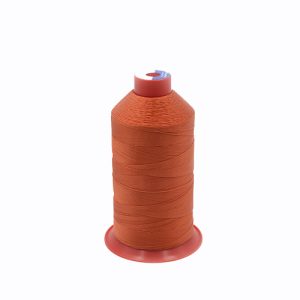
Bonded Nylon Thread
Bonded Nylon Thread
Features
- 15%-30% higher than ordinary nylon thread.
- Ultra-high wear resistance: Nylon itself has excellent wear resistance. After bonded treatment, the thread structure becomes more stable, and its friction resistance is further enhanced, making it suitable for high-frequency stress scenarios (such as luggage corners and shoe stitching).
- Tensile resistance and resilience: It retains the high elasticity of nylon, is not easy to deform after being stressed, and the stitched joints are not easy to crack due to pulling.
- Moisture and heat resistance: In humid or high-temperature environments (such as washing and outdoor rain), the strength decreases slightly, and it is more resistant to aging than ordinary nylon thread.
- Low fuzz characteristic: The surface film coating reduces fiber fuzz, resulting in neater stitches after sewing. It is especially suitable for precision fabrics (such as leather and waterproof cloth).
Uses
- Leather shoes
- Leather bag
- Leather belt
- Tent
- Backpack
- Safety belt / Seatbelt
- Fire-fighting clothing
- Sports shoes
- Backpack
- Waterproof cloth / Tarpaulin
- Canvas
- Denim
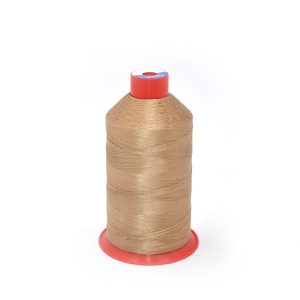
Automotive Sewing Threads
Automotive Sewing Threads
Features
Ultra-High Strength & Wear Resistance
Car seats, safety belts, door panel fabrics endure constant stretching and friction (e.g., passenger entry/exit, seat adjustment). The sewing thread must have much higher breaking strength than regular garment threads, with no easy fuzzing or breaking after long-term friction.
It is usually made of high-strength fibers (nylon, polyester, aramid, etc.); high-strength industrial yarns are even used for critical parts like safety belt sewing.
Environmental Stability
- Temperature resistance: Withstands extreme in-car temps (over 70℃ in summer sun, below -30℃ in winter) without brittleness, deformation or significant strength loss.
- Light resistance: No fading or aging from long-term sunlight (especially UV), preventing interior seam splits due to thread breakage.
- Chemical resistance: Resists in-car contaminants (sweat, beverages, cleaners) without mildew or degradation.
Eco-Friendliness & Safety
Complies with automotive environmental standards (EU REACH/RoHS, China GB), containing no formaldehyde or heavy metals to avoid odors or health risks.
Flame retardancy is required for parts near the engine compartment to reduce fire risks.
Appearance Consistency
Thread color must match interior fabrics accurately, with high wash/light fastness to avoid fading/color bleeding.
Uniform thread evenness (no joints, minimal fuzz) prevents uneven stitches or exposed ends after sewing.
Uses
- Seat fabric
- Backrest
- Seat cushion
- Safety belt / Seatbelt
- Airbag
- Door panel decorative cloth
- Car headliner
- Car carpet
- Pillar trim panel
- Steering wheel cover
- Armrest box
- Car floor mat
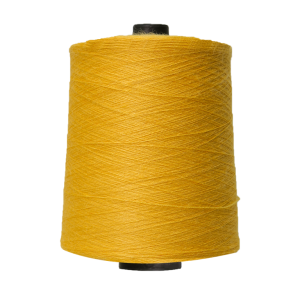
50% Viscose 28% PBT 22% Nylon Long Hair Core Spun Yarn
50% Viscose 28% PBT 22% Nylon Long Hair Core Spun Yarn
Features
- Soft viscose long-fiber outer layer
- High-strength nylon filament inner core
- Combines comfort, drapability and durability in one
- Bright luster and full color development
- Suitable for various fabrics such as single-sided jersey, double rib knit, woven shirts and women’s blouses
Uses
- Single-sided jersey knit
- Double rib knit
- Piqué knit
- Woven shirt fabric
- Lightweight women’s blouses
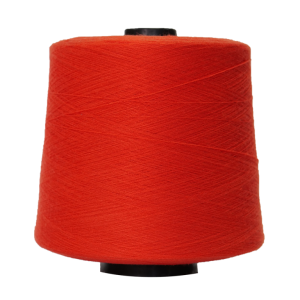
28% Acrylic 22% Nylon(8D) 28% PBT 22% Viscose Core spun Yarn
28% Acrylic 22% Nylon(8D) 28% PBT 22% Viscose Core spun Yarn
Features
- Durable 8D core
- Multi-purpose blended yarn
- Medium weight (28S/2)
- Easy care
- Balanced short-fiber wrapping
Uses
- Knitwear / Knitted fabrics
- Woven fabrics
- Home textiles
- Apparel / Clothing
- Furniture decorative fabrics
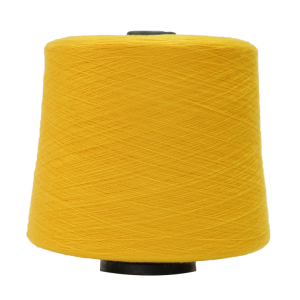
28% Acrylic 22% Nylon(1.5D) 28% PBT 22% Viscose Core spun Yarn
28% Acrylic 22% Nylon(1.5D) 28% PBT 22% Viscose Core spun Yarn
Features
- High toughness and strong durability
- Excellent elasticity and good stretch performance
- Shiny appearance and bright colors
- Good wrinkle resistance and anti-pilling performance
- Easy care — machine washable and tumble dryable
Uses
- Sweaters, cardigans, pullovers, dresses, blouses
- Knitted tops, athletic wear, sportswear
- Socks, leggings, hosiery
- Home textiles (e.g., blankets, carpets, cushions)
- Furniture decorative fabrics, curtains, tapestries
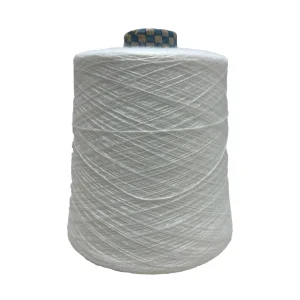
52% Acrylic 28% PBT 20% Nylon Core spun Yarn
52% Acrylic 28% PBT 20% Nylon Core spun Yarn
Features
- Soft, shiny and affordable
- Durable, elastic and stretchable
- High strength, good resilience and wear resistance
- Warm and easy to care for
- Made with core-spun technology
Uses
- Sweater
- Hat
- Gloves
- Blanket
- Carpet
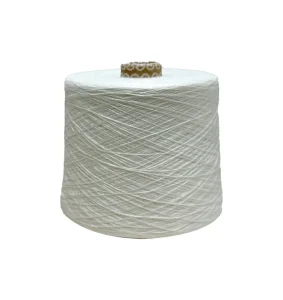
34% Acrylic 44% PBT 22% Nylon Core Spun Yarn
34% Acrylic 44% PBT 22% Nylon Core Spun Yarn
Features
- Soft, elastic, good shape retention and warm
- Anti-pilling and not easy to shed lint
- Smooth texture, easy for knitting and crocheting
- Long-lasting bright colors
- Lightweight and comfortable, with thickness suitable for winter knitwear
Uses
- Sweater
- Cardigan
- Hat
- Gloves
- Scarf
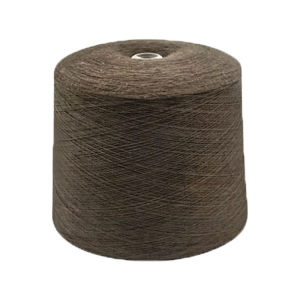
47% Viscose 26% PBT 22% Nylon 5% Lurex Silver Core Spun Yarn
47% Viscose 26% PBT 22% Nylon 5% Lurex Silver Core Spun Yarn
Features
- Enhanced durability
- Soft and smooth
- Excellent drapability
- Lustrous / Shiny
- Breathable and moisture-absorbent
Uses
- T-shirt
- Dress
- Sweater
- Hat
- Scarf
- Women’s blouse
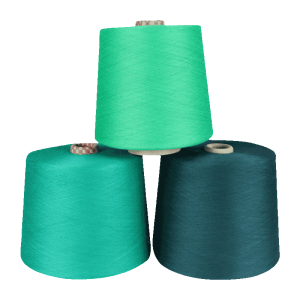
47% Viscose 26% PBT 22% Nylon 5% Lurex Crystal Core Spun Yarn
47% Viscose 26% PBT 22% Nylon 5% Lurex Crystal Core Spun Yarn
Features
- Reliable spinning technology
- Excellent yarn performance
- Good elasticity
- Minimal core exposure
Uses
- Socks
- Sweater
- Sportswear
- Stretch clothing
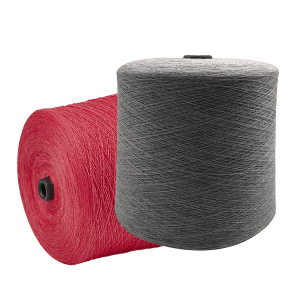
40% Acrylic 30% PBT 30% Nylon Core Spun Yarn
40% Acrylic 30% PBT 30% Nylon Core Spun Yarn
Features
- Anti-pilling
- Lightweight and fluffy
- Lustrous / Shiny
- Rich color
Uses
- Sweater
- Socks
- Bed sheet
- Sofa cover
- Scarf
- Gloves
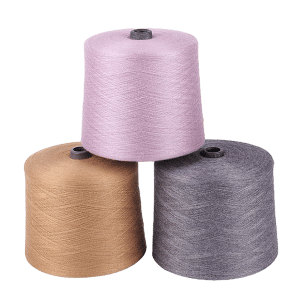
50% Viscose 28% PBT 22% Nylon Core Spun Yarn
50% Viscose 28% PBT 22% Nylon Core Spun Yarn
Features
- The filament core yarn has excellent performance.
- The outer staple fiber boasts outstanding performance.
Uses
- Sweater
- Socks
- Bed sheet
- Sofa cover
- Scarf
- Gloves
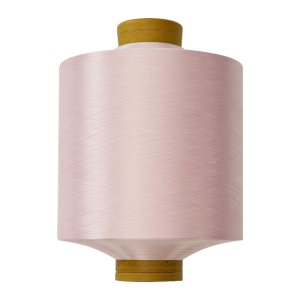
40D/12F*2 Nylon High Elastic Yarn
40D/12F*2 Nylon High Elastic Yarn
Features
- Excellent elasticity: It rebounds quickly after stretching, with an elongation rate of 200%~500%. It also has a high rebound rate and is not easy to loosen.
- Nylon material properties: It inherits the advantages of nylon, such as wear resistance, impact resistance and light weight, while also having the bulkiness of stretch yarn and a soft hand feel.
- Wide applicability: It has good alkali resistance and organic solvent resistance, and excellent dyeability, making it suitable for various textile scenarios.
Uses
- Intimate apparel (underwear, swimwear), sportswear, stretch jeans;
- Knitted items such as socks and scarves;
- Industrial or home textile products like sofa covers and elastic bandages.
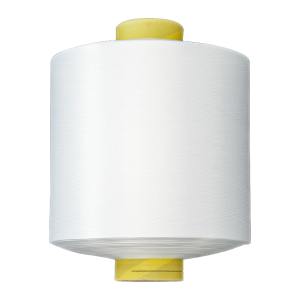
50D/24F Nylon Stretch Sportswear Yarn
50D/24F Nylon Stretch Sportswear Yarn
Features
- Elasticity meets sports needs: Manufactured through special twisting, setting and other processes, it has excellent elasticity and resilience. It can stretch and contract freely with large-range limb movements, reducing a sense of restraint during exercise, fitting the body without tightness.
- Inherits the advantages of nylon material: Retains the wear-resistant and high-strength properties of nylon fibers, which can withstand frequent friction and stretching during exercise, extending the service life of sportswear. At the same time, the lightness of nylon also makes the clothing lighter to wear, avoiding a sense of heaviness.
- Functional adaptation to sports scenarios: The improved nylon stretch yarn for sportswear also optimizes breathability and moisture absorption and sweat-wicking performance. It helps quickly wick away sweat during exercise, keeps the skin dry, and improves wearing comfort. It is especially suitable for making high-intensity sportswear such as running, fitness and ball sports clothing.
Uses
- Velvet socks
- Pantyhose
- Wool yarn / Woolen yarn
- Underwear
- Curved yarn
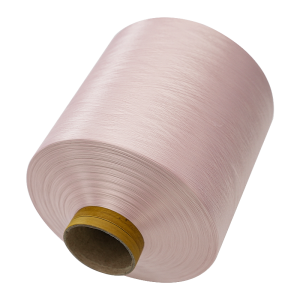
50D/24F*2 Double strand Nylon Elastic Yarn
50D/24F*2 Double strand Nylon Elastic Yarn
Features
- Balance between elasticity and support: As a stretch yarn, it has good elasticity and resilience. The double-ply structure prevents excessive slack, allowing it to stretch and contract flexibly with body movements—fitting the body while reducing restraint.
- Enhanced durability: Nylon itself has high wear resistance, and the double-ply design further improves the yarn’s tensile and abrasion resistance, extending the service life of sportswear.
- Comfort and functionality: The 24F multi-filament structure makes the fabric more breathable.
- Combined with nylon’s quick-drying property, it helps wick away sweat and moisture during exercise to keep the skin dry, making it suitable for high-intensity sports scenarios such as running and fitness.
Uses
- High-intensity sportswear: e.g., running clothes, fitness clothes, yoga wear, badminton clothes, etc.
- Outdoor functional clothing: for hiking, mountaineering, etc.
- Professional sports accessories: e.g., sports headbands, wristbands, tight sports arm sleeves, etc.
- Stretchy casual wear: jeans, casual pants, stretch T-shirts, etc.
- Intimate apparel: some types of underwear, leggings, etc.
- Home textiles: e.g., stretchy sofa covers, curtains, etc.
- Industrial/protective products: some lightweight protective gloves, work pants fabrics
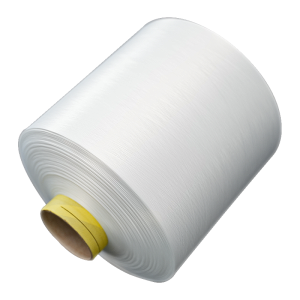
70D/24F Nylon Elastic Yarn For Textile Use
70D/24F Nylon Elastic Yarn For Textile Use
Features
- Raw Materials & Basic Properties: Excellent elasticity, with an elongation rate of 200%-300% and fast rebound, suitable for fabrics requiring stretch; nylon material has much higher wear resistance than cotton and polyester, featuring high strength, tear resistance, and light weight without a heavy feel.
- Structure-Added Features: Composite of 70D and 24D dual filaments — the thicker filament provides support and stiffness, while the thinner one enhances softness, bulkiness and breathability, balancing the texture; the dual-filament structure improves stability, making the fabric wash-resistant, anti-loosening and anti-pilling.
- Scenario Adaptability: High versatility, can be used alone or in blends for sportswear, casual wear, etc.; wrinkle-resistant, low shrinkage rate, and easy to care for, suitable for fast-paced lifestyle needs.
Uses
- Fabrics for sportswear, yoga wear, etc., which require elasticity and support;
- Daily clothing such as casual pants and stretch shirts, balancing comfort and durability;
- Some home textile fabrics (e.g., stretch bedding), meeting the need for stretch.
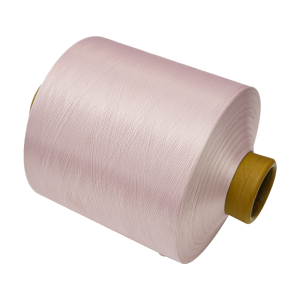
70D/24F*2 Nylon Elastic Yarn For Weaving
70D/24F*2 Nylon Elastic Yarn For Weaving
Features
- Extremely high wear resistance, far exceeding that of cotton and polyester. It withstands long-term frequent friction, significantly extending the service life of fabrics;
- High strength: The double-ply structure enhances tensile and tear resistance, preventing damage even under stress;
- Low density: The fabric is lightweight without a heavy feel, suitable for summer and scenarios requiring portability;
- Excellent elasticity (elongation rate: 200%-300%) with quick rebound, endowing the fabric with high stretchability. It fits body movements and improves wearing comfort, making it especially suitable for clothing requiring high elasticity.
Uses
- Sports apparel: Suitable for running clothes, fitness clothes, etc.
- Daily casual clothing: Used for jeans, stretch T-shirts, etc.
- Home textile field: Can be used to make stretchy sofa covers, curtains, etc.
- Industrial/protective products: Suitable for lightweight protective gloves, work pants fabrics, etc.
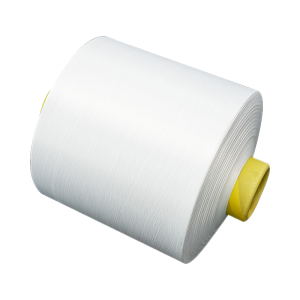
100D/36F Nylon Elastic Yarn
100D/36F Nylon Elastic Yarn
Features
- Excellent elasticity: The texturing process endows it with an elongation rate of 150%-250% and quick rebound, making it suitable for fabrics that need to stretch and contract with body movements;
- Advantages of nylon material: Superior wear resistance to cotton and polyester, withstanding frequent friction and extending service life; the 100D thickness combined with the 36F multi-filament structure ensures high strength and resistance to tension and tearing; low density makes the fabric lightweight and comfortable;
- Structure adaptation: 36F enhances softness and breathability, while 100D provides moderate stiffness, balancing the fabric texture.
Uses
- Apparel Field: Suitable for sports pants, casual jackets, stretch dresses that balance elasticity and fit, as well as skin-friendly, stretchy and form-fitting underwear/undershirts;
- Home Textile & Industrial Field: Can be used to make stretch pillowcases and sofa fabrics that are wear-resistant and easy to care for, and is also applicable to tough yet lightweight light outdoor products (e.g., backpacks, tent fabrics).
High-Quality Textile Thread Supplier
Honor one's commitment
Quality Awareness
Delivery Schedule Control
Get a Quote Today
Contact our yarn sales team.